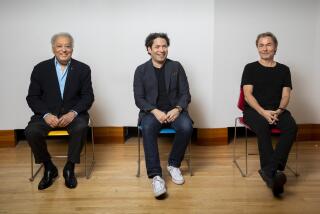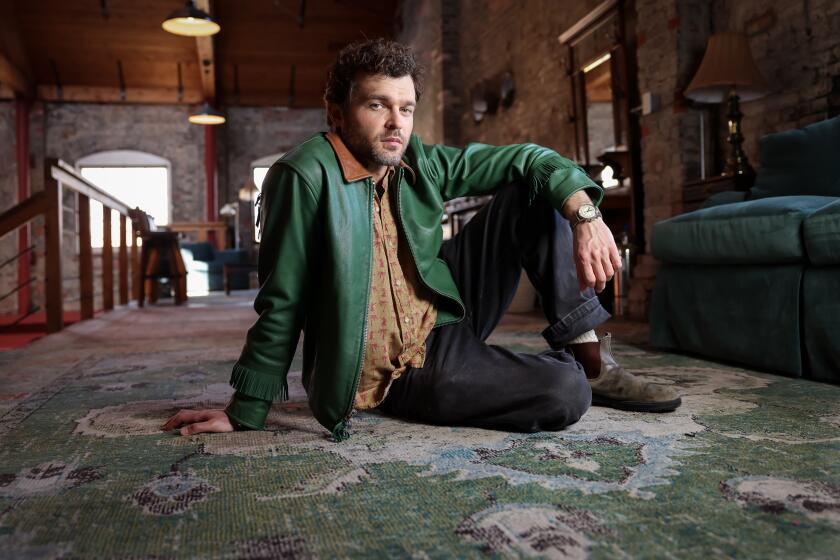Jimmy Dolan, 91; Librarian for Music Giants
- Share via
If Zubin Mehta or Carlo Maria Giulini had to shift gears at the last minute because a flutist was missing or a violist called in sick, the first person they turned to was Jimmy Dolan.
A cheerful man with a lilting walk and a weak spot for Twinkies, Dolan was the Los Angeles Philharmonic’s librarian for 32 years. He was the keeper of the scores, who found the music the maestros wanted to conduct, recorded their musical annotations, repaired and reprinted the music and placed the corrected versions on each of the performers’ stands.
If a player was unexpectedly absent, Dolan would help the conductor reprogram the concert by digging around in his library for a suitable alternative -- for example, a string piece such as Mozart’s “Eine Kleine Nachtmusik” if the wind section was missing a crucial member. Often the library was in the back seat of Dolan’s car: He never traveled without backup.
Such resourcefulness was just one of the traits that made Dolan a legend at the Philharmonic. He not only owned a coveted collection of music -- including 1,000 titles and hundreds of first editions, all of which he eventually donated to the orchestra -- he was also a walking repository of music history.
His resume lists a who’s who of the last century’s musical giants: During the first half of his six-decade career, Dolan was librarian to Arthur Fiedler, Richard Rodgers, Arturo Toscanini, Leopold Stokowski, Sir Thomas Beecham and Igor Stravinsky. During the second half, at the Philharmonic, he was an indispensable advisor to Mehta, Giulini, Andre Previn and Esa-Pekka Salonen.
Erich Leinsdorf, the late Viennese conductor known for his often harsh appraisals of colleagues, once called Dolan “the greatest orchestral librarian I have ever met in my somewhat lengthy experience.”
Dolan, who died of heart failure in a Santa Monica nursing facility Jan. 28, one day after his 91st birthday, had thought he would become a symphony conductor. Born in Providence, R.I., into modest circumstances, he was able to commute to Boston to the New England Conservatory of Music, where he studied violin, because his father worked for the railroad. His frequent seatmate on the train was Leonard Bernstein, who was studying at Harvard.
While at Boston University in 1934, Dolan found Fiedler’s number in the phone book and arranged to take conducting lessons. Watching Fiedler, then early in his tenure as conductor of the Boston Pops Orchestra, convinced Dolan “what a long, hard road it is to conducting, even after you get there,” he told the Los Angeles Times in 1982. His dream of wielding the conductor’s baton soon “went out the window.”
Instead, he became assistant librarian of the Boston Pops and Fiedler’s personal librarian. The conductor’s requests were often challenging. If he heard something he liked on the radio, he sent Dolan to search for the music. Fiedler was particularly fond of Johann Strauss waltzes, which were hard to find.
Dolan remained with Fiedler for eight years. Then, in 1942, he moved to the NBC Symphony Orchestra, which had been founded five years earlier to lure Toscanini out of retirement. Dolan served the Italian conductor for the next 12 years.
Dolan traveled with Toscanini on the symphony’s 1950 cross-country tour. He was personally responsible for five large trunks of music for the 110 musicians who would perform 50 works during 21 concerts. On the special 12-car train, Dolan commanded an entire car for the music library.
He was also the custodian of Toscanini’s batons, which a Philadelphia dentist made by hand from the finest materials. Being in charge of them was no easy task, considering that the temperamental conductor could break several batons in anger during the course of a rehearsal.
Sometimes at rehearsals the maestro would yell “Do -- la!” “Everyone wondered what ‘Dolan’ had done, and I’d come running,” the librarian recalled in the 1982 interview. But Toscanini, whose heavily accented English could be easily misunderstood, wasn’t always venting at Dolan. As the librarian explained, “ ‘Do’ is C and ‘la’ is A. He wasn’t calling me, he was calling the interval!”
Toscanini quickly came to trust Dolan. After their first season together, when the maestro had conducted all nine Beethoven symphonies, he presented the librarian with facsimile copies of all the Beethoven letters in America. He later gave Dolan a gold medallion carved with Toscanini’s likeness and a personal inscription.
Dolan developed a hobby of making copies of scores with the conductor’s notations, “all the editings and markings of his genius,” Dolan wrote in a 1967 article. Toscanini would sometimes sing his changes to the librarian over the telephone. Other conductors have studied Dolan’s copies to understand how the man considered the most brilliant conductor of his era shaped a particular piece of music.
One of the toughest assignments Toscanini ever gave Dolan came when the transcontinental tour reached the South. The conductor was expected to offer a rendition of “Dixie.” Of course, that song was not in Dolan’s extensive classical library, so he had to scurry for a copy.
“As the story goes, my dad was able to find a piano vocal, a little honky-tonk [version]. The maestro orchestrated it, and it was a great hit,” said Dolan’s son, Robert.
“In my entire career,” Jimmy Dolan said in 1982, “a number has never been canceled because I was unable to get the music, but you always have that nightmare: ‘What happens if I fail?’ ”
To guard against such disasters, Dolan was always collecting music, often working months in advance to procure a score half a world away. In 1967 he provided the scores for the last recording Stravinsky made of his masterpiece “The Firebird” (and he personally delivered the then-85-year-old composer to the Hollywood recording studio where it was made). Other times, Dolan picked up a piece of music from the airport just in time for it to be carried onto the stage.
He learned to pack double sets of music when on the road, especially during Mehta’s tenure at the Philharmonic. The conductor was known to absent-mindedly leave music scores in the back seats of taxicabs.
If musicians lost their music, Dolan was their rescuer too.
“He had it all covered, even if he had to handwrite a part into a different key for a player who lost their part or had the music for the wrong instrument,” said Jeff Reynolds, a bass trombonist with the Philharmonic who knew Dolan for many years. “He was truly one of a kind.”
Dolan passed his love of music to his two children. Robert is librarian for the Los Angeles Master Chorale, Los Angeles Chamber Orchestra and Pasadena Symphony. His twin sister, Katherine, was also an orchestral librarian who worked with her father at the Philharmonic.
When she died of a heart attack in 1995, Dolan, then 80, decided to retire. In addition to his son, he is survived by his wife of 57 years, Helen.
More to Read
The biggest entertainment stories
Get our big stories about Hollywood, film, television, music, arts, culture and more right in your inbox as soon as they publish.
You may occasionally receive promotional content from the Los Angeles Times.











